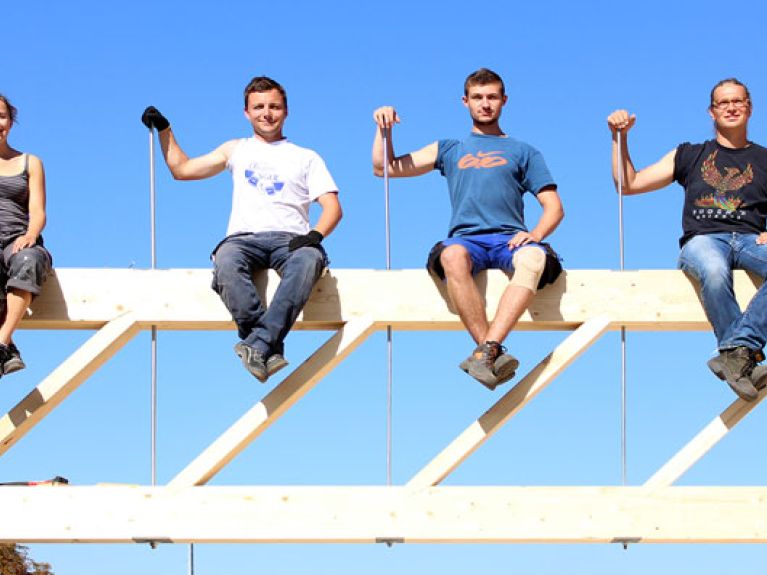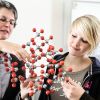Lateral thinkers, doers, and visionaries honoured
From their ivory towers to the mainstream of society: Here are Germany’s academics of the year and their projects, honoured by the German Association of University Professors and Lecturers.

At the German Academia Gala on 3 April 2017 in Munich, the German Association of University Professors and Lecturers honoured outstanding people and projects, and awarded them prize money.
Meeting place for refugees
A total of 16 architecture students and three professors from Kaiserslautern Technical University created a meeting place for refugees on the site of a former barracks in Mannheim. Within the space of three months the prospective architects designed and built a large timber pavilion, which serves not just as a meeting point but also as a place of retreat.
Achim Meyer auf der Heyde of Deutsches Studentenwerk (the Association of German Student Services Organisations) honoured the Spinelli Barracks construction project as a “project for refugees with refugees”. The latter were able to state their preferences with regard to the pavilion’s design, and helped build it. “They were glad to be of assistance,” architecture student Tobias Kohlstruc recalls. “We all communicated in English, by gesture, or by demonstrating how things were done.”
As such, this year a large team shares the “Student of the Year” prize, which is worth EUR 5,000.
Commitment to cultural heritage and science
Crises and wars force people to flee and often rob them of their past and a future. For its efforts to protect the world’s cultural heritage and on behalf of scholars in regions experiencing crisis, the Gerda Henkel Foundation earned the accolade “2017 Academic Foundation of the Year”.
A support programme for academics who have fled was singled out for particular praise. At the prize-giving ceremony Bernhard Kempen, President of the German Association of University Professors and Lecturers said, “the way, after they have fled to Europe, that the Gerda Henkel Foundation gives them an opportunity to pursue their academic career and develop perspectives for rebuilding their home country is impressive.”
The object of the non-profit Gerda Henkel Foundation is to promote the humanities world-wide. With the “Patrimonies” project it has since 2015 been committed to the preservation of cultural heritage, in particular in regions experiencing crisis. Since it was established in 1976, the foundation has supported more than 6,600 research projects to the tune of some 160 million euros.
Academics honoured
Three other academics and one minister also took the limelight at the German Academia Gala:
- For the third time, the members of the Association chose as “2017 Chancellor/President of the Year” Lambert T. Koch, Chancellor of the University of Wuppertal, for his services as university manager and motivator of his staff and students.
- “2017 Young Academic of the Year”: Michael Saliba, Marie Curie Fellow at the Swiss Federal Institute of Technology in Lausanne. He is conducting research into solar energy and has a vision that “one day the entire Sahara will be full of low-cost, sustainable solar cells”.
- “2017 University Teacher of the Year”: Michael Wolffsohn, Professor of Modern History at Universität der Bundeswehr (German Armed Forces University) in Munich. The self-proclaimed lateral thinker is not only a busy academic. With his “Atlantic” residential project in Berlin he promotes the coexistence of religions and cultures.
Mathias Brodkorb, Minister of Finance of the Federal State of Mecklenburg-Western Pomerania was honoured as “2017 Science Minister of the Year”. DHV President Bernhard Kempen referred to him as a “pioneer against the bureaucratization of science”.
More about the preservation of cultural heritage of the Gerda Henkel Foundation:
Help for Syria’s cultural heritage

